|
|
|
Sort Order |
|
|
|
Items / Page
|
|
|
|
|
|
|
| Srl | Item |
| 1 |
ID:
162638
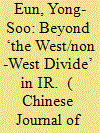

|
|
|
|
|
| Summary/Abstract |
Since the publication a decade ago of Acharya and Buzan’s seminal forum, ‘Why is there no non-Western IR theory?’, voluminous studies have attempted to ameliorate the Western parochialism of international relations (IR) studies. This trend includes a strong and increasing commitment among non-Western (in particular, Chinese) IR scholars to the development of ‘national schools’. However, Acharya and Buzan point out that non-Western IR theory-building enterprise ‘cannot be a conversation among the likeminded’. They add: the project ‘is more likely to fail if it does not draw in the broadest group of scholars, including those in the Western mainstream’. In a related vein, Peter Katzenstein writes that the diversity and heterogeneity of world politics cannot be captured by binary distinctions between Western and non-Western IR theory. Rather, our focus, he notes, should be on interactions between different types of knowledge. In short, we need a two-way ‘dialogue’ across ‘the West/non-West divide’ to transform the current Western-centric IR into a global discipline. A critical question, then, is how we can ensure such a dialogue without descending into a narcissistic turf war. This article tackles the how-question head-on in its discussions of the diverse kinds and properties of dialogue.
|
|
|
|
|
|
|
|
|
|
|
|
|
|
|
|
| 2 |
ID:
147381
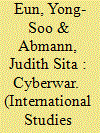

|
|
|
|
|
| Summary/Abstract |
This article examines the implications of cyberwar for national security and traditional warfare. While not making traditional war obsolete, cyber-weapons can nonetheless be force-amplifiers for kinetic attacks in future wars. Not only are cyber-weapons easier to deploy, they can also be activated much more cheaply than conventional weapons. This cost–benefit ratio levels the playing field, especially to the benefit of Third World countries which lack considerable leverage in terms of exercising traditional military power. By bringing new aspects to the theater of war, cyberwar asks us to revamp our policy and study of security, war, and power. Although it does not change the very nature of warfare which remains political, instrumental, and violent, cyberwarfare will reshape the ways in which war begins or is carried out in the near future. Our analytical and theoretical understanding of the international politics of the digital age can be enriched by taking what is happening in cyberspace more seriously.
|
|
|
|
|
|
|
|
|
|
|
|
|
|
|
|
| 3 |
ID:
165473
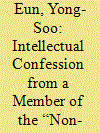

|
|
|
|
|
| Summary/Abstract |
David Lake wrote that International Relations (IR)1 will be a more diverse and better field of study if we embrace varied “life experiences and intuitions,” especially those of “marginalized” scholars, about politics and how the world works. Although concurring with his admonition, I also believe that his call for “greater diversity” in IR and his approach to realizing it need to be subject to critical scrutiny, being reconsidered in terms of reflexivity—more specifically, self-reflection by “marginalized” scholars. For this reason, as a “non-white” scholar working in a “non-Western” (or, in Lake’s words, “underrepresented”) IR community, I want to make my own confession to better understand what is at stake in promoting diversity in the academy from a different angle.
|
|
|
|
|
|
|
|
|
|
|
|
|
|
|
|
| 4 |
ID:
157816
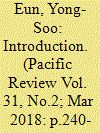

|
|
|
|
|
| Summary/Abstract |
This opening article presents rationales for the Special Section which analyses South Korea's debates and discourses on crucial issues related to East Asian regional politics. The article opens with a consideration of why attention is drawn to South Korea and particularly to its discourses. Expanding upon constructivist theoretical insights, this article shows how they matter in foreign policy-making and state behaviour. In addition, the article clarifies the scope of analysis of this Special Section. While recognising that many different actors and issues shape the regional order in East Asia to varying degrees, we hold that the most direct impact on changes and/or continuity in that order comes from state actors in the realm of security (or the security–economy nexus). The article ends on a cautiously optimistic note: although the perspectives and discourses analysed in this Special Section are not exhaustive, the analysis can serve as a useful reference point for discussion that seeks to advance our understandings of how South Korea is likely to behave toward its neighbours and what the future of the East Asian regional order will look like.
|
|
|
|
|
|
|
|
|
|
|
|
|
|
|
|
| 5 |
ID:
186122
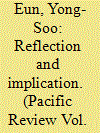

|
|
|
|
|
| Summary/Abstract |
This article elaborates on the following two questions and their implications. First, how can we as analysts offer compelling explanations for weak states’ agency and behaviours in the current global political and economic environments marked by multiplicity and fluidity? Second, what are the major causal factors that enable or influence weak actors’ agency, and under what conditions is their agency facilitated or constrained? Although an extensive literature in the discipline of International Relations (IR) confirms that today’s world is highly complex and diverse in terms of who or what matters in global politics, the subject of weak states and their agency is still not adequately discussed. Furthermore, the issues of methodology and theorising for the subject remain uncharted territory. By reflecting upon the main arguments and empirical findings of our special issue, this concluding article makes a case for ‘open-ended’ analytic eclecticism as an alternative methodological/analytical scheme, and lays preliminary ground for theorising weak states’ agency in the changed and changing global environments in the twenty-first century.
|
|
|
|
|
|
|
|
|
|
|
|
|
|
|
|
| 6 |
ID:
131553
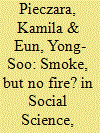

|
|
|
|
|
| Publication |
2014.
|
| Summary/Abstract |
Causality in social science is hard to establish even through the finest comparative research. To ease the task of extracting causes from comparisons, we present the benefits of tracing particularities in any phenomenon under investigation. We introduce three real-world examples from 2011: British riots, worldwide anticapitalist protests, and the highway crash near Taunton in southwestern England. Whereas all of these three examples have broad causes, we embark on the quest after specific factors. The Taunton accident can send a powerful message to social scientists, which is about the danger of making general statements in their explanations. Instead of saying much but explaining little, the merit of singling out the specific is substantial. As social scientists, when we are faced with "smoke" but no "fire," let us then focus on the part that is distinct.
|
|
|
|
|
|
|
|
|
|
|
|
|
|
|
|
| 7 |
ID:
186109
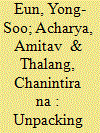

|
|
|
|
|
| Summary/Abstract |
This introductory article provides rationales and contextual background for the special issue which examines how weak states in Asia actualise and exercise their agency in the twenty-first century regional or global environments. The article opens with a consideration of why attention is drawn to the agency of the weak. Weak states are often treated as ‘objects’ of international politics rather than ‘subjects’, and their foreign policy actions are commonly taken to be ‘reflexive’ of external constraints, such as fluctuations in the balance of power in the international system. We disagree with this view. We argue that weak actors can demonstrate varieties of agency regardless of their position in the international system in terms of material capabilities. To clarify this point, the article reflects on the changed and changing global and regional environments and order. Rather than seeing them through the lens of great power politics and its signature concept of ‘polarity’, the article offers an alternative notion, namely a ‘multiplex’ world, and identifies the key nature of order therein: multiplicity and fluidity. Both material and normative power have already and continue to become fragmented, decentralised, and dispersed within and across states. While emphasising that such a multifaceted and fluid world opens up a wide avenue of agency for weak actors, this article also notes that the weak has varieties of agency as potentials.
|
|
|
|
|
|
|
|
|
|
|
|
|
|
|
|
| 8 |
ID:
126353
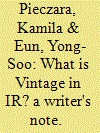

|
|
|
|
|
| Publication |
2013.
|
| Summary/Abstract |
The style of writing in international relations (IR) has evolved in recent decades. The lessons of "vintage" IR, to which we return in this article, have been largely forgotten by those writing in the discipline today. A merit will be substantial, we argue, in drawing more heavily from works by previous masters. Several lessons in style follow.
|
|
|
|
|
|
|
|
|
|
|
|
|
|
|
|
| 9 |
ID:
117200
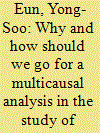

|
|
|
|
|
| Publication |
2012.
|
| Summary/Abstract |
This article argues that International Relations (IR) researchers concerned with why-questions about the state's external behaviour ought to employ a multicausal approach attentive to the interrelated relationship between external structures and internal agents, presenting the (meta-)theoretical rationales underlying its argument. Here the author suggests 'a rich/bold ontology' regarding foreign policy behaviour. Then the article elaborates on detailed and explicit guidelines on how to traverse the bridge that connects the insights of that rich ontology to the empirical research necessary to make claims about the real world of any one moment. In a related vein, the article claims that a multicausal approach should be established using what the author calls 'loose-knit deductive reasoning' through which epistemological and methodological openness can be preserved in a manageable way. More importantly, this article discusses the role of theory for IR scholarship and the standards for judging theoretical contributions and progress in the field of IR. Ultimately, the author argues that a complex and flexible approach - both as a useful mode of explanation and as a progressive model of theory construction - can make important contributions to a better understanding of foreign policy and world politics, not only because it enables researchers to become keenly sensitive to the complex reality underlying a nation's foreign policy and to the interrelated relationship between structures and agents in international relations, but also because it can serve to provide a secure base for the progressive accumulation of the evidence closely associated with multiple causation on which any adequate explanation about complex foreign policy behaviour must surely be founded and without which general theory cannot really flourish.
|
|
|
|
|
|
|
|
|
|
|
|
|
|
|
|
|
|
|
|
|